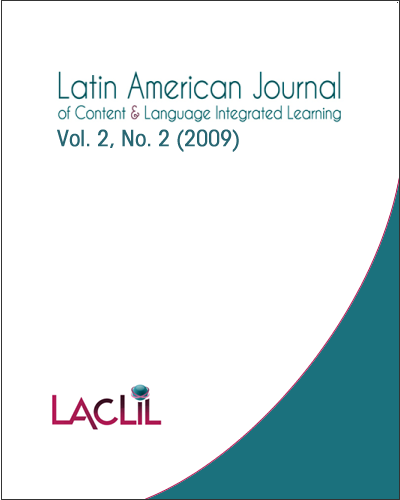Teacher Training and Competences for Effective CLIL Teaching in Argentina
DOI:
https://doi.org/10.5294/laclil.2009.2.2.14Abstract
Given the importance of Content Language Integrated Learning (CLIL) for bilingual institutions, Argentine universities and teaching training colleges need to incorporate this approach in their curricula to certify that graduate teachers are qualified to teach not only English as a foreign language (EFL) but also content-based subjects in English. This paper focuses on teacher training for the development of theoretical and methodological competences. While the former include knowledge of the theories that constitute the basis of content and language learning, the latter integrate teaching and learning strategies, as well as learning styles. Teacher training involving these competences results in effective CLIL teaching.Downloads
Download data is not yet available.
Downloads
Published
2009-12-16
How to Cite
Pistorio, M. I. (2009). Teacher Training and Competences for Effective CLIL Teaching in Argentina. Latin American Journal of Content & Language Integrated Learning, 2(2). https://doi.org/10.5294/laclil.2009.2.2.14
Issue
Section
Commentaries
License
This Journal and its articles are published under the Creative Commons CC BY 4.0 DEED Attribution 4.0 International license. You are free to: Share — copy and redistribute the material in any medium or format for any purpose, even commercially. Adapt — remix, transform, and build upon the material for any purpose, even commercially. The license cannot revoke these freedoms as long as you follow the terms of the license.








